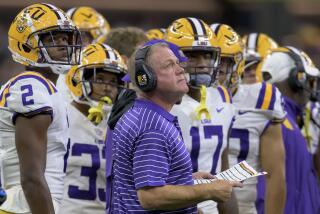Whatever He Chooses, It’s His Business
- Share via
Should the young marvel himself solicit your opinion, seek out your advice, ask you which way he should turn, then perhaps, just perhaps, you could put aside the tender feelings you have for your favorite football team, address his request with an open mind, consider the kid’s best interests and say what needs to be said.
That Bo Jackson should stick to baseball.
Forget for a moment the donation he might make to the team and game that you favor, and weigh what is most advantageous to the young man himself, to this beau ideal who represents so much of what is good and graceful in the modern athlete. Consider the needs of Bo Jackson above and beyond your own.
Although the future is known to no one, baseball theoretically can do for Jackson what football undoubtedly never will. It can keep him from enduring middle age and senior citizenry with a scrap of cortisone-laced flesh for a shoulder and a hunk of surgically repaired bone for a knee.
It can afford him a career of greater length and a career of greater choice, since a football player plays only where he is ordered to play, with no means of escape. Free agency in baseball is a hatch that once again has been unsealed. Free agency in football is as dead as dead can be.
Baseball promises higher income over a longer period of time. Its salary range is staggering compared to football’s, and its pension plan is vastly superior. After a certain number of years in the same game, or with the same team, a baseball player is eligible to exert some authority over what he does and where he does it.
A football player’s only option is to whine and shirk his work and make himself so personally undesirable to his employers as to persuade them to foist him upon someone else, as another splendid professional running back recently did.
A back as able as Bo Jackson, and an effort as astonishing as his several nights ago in Seattle, can set off a chain reaction of conclusion jumping, the result of which is that those so impressed by him suddenly know exactly what is best for him, and speculate unfairly that football, not baseball, is the game for which he is best suited.
These same people have no personal stake in Jackson’s health or wealth, they merely will wring out of him whatever they can, succeeding through him vicariously, until there is nothing left, whereupon they will turn their loving gaze to whichever new celestial body comes along.
Jackson, naturally, will do as he pleases, and if by some chance he changes his original game plan and chooses football as his life’s work, well, good for him, and good for all those lovers of the Los Angeles Raiders who already have begun their swoon. The thought of this kid leaving them, now that they have come to adore him, is a painful one, and never mind the exigency of the quarterback situation or the offensive line’s, or even the fate of that gravel pit being dug out there in the suburbs, because latching onto Bo Jackson takes priority over all that.
Jackson says he can not continue to play two professional sports indefinitely, and we believe him, even though somewhere in the recesses of our mind we understand that even a slugging outfielder who strikes out too often and a charging tailback who misses all of training camp is far better than most of the other players around who wear either uniform.
The threat alone of Bo Jackson is worth plenty to those who employ him, if only for the pangs of anxiety it sends through the pitcher who must pitch to him, or the linebacker who must pursue him.
What we tend to forget about football players is, well, the football players themselves. Once they are gone, they are completely forgotten, save for some Hall of Fame ceremony or charity golf tournament somewhere. We care not about their aching spines and crippled legs, nor about their legal wars to prove to insurance underwriters that their physical agony directly results from an old football injury, as opposed to some more natural cause.
If Jackson does the proper thing and sticks to baseball, he stands a good chance of making a better living, maintaining a sounder being and influencing his own destiny.
The average income per player in the major leagues last season was $410,732, and the potential of salaries of $2 million a year already has been realized by several men, one of whom, Don Mattingly, is in the process of flirting with $3 million. Thanks to a third party’s recent ruling, Mattingly also would have been entitled to avail his services to other employers, which is something the stars of the football world have been unable to do.
There was a baseball player last summer who was still out there pitching at the more than ripe age of 47, and several others who supplied living proof that 40 wasn’t fatal. The number of football players 35 or older can be counted on relatively few fingers, and for every Dick Butkus or Gale Sayers we remember with reverence, we conveniently forget how physical infirmities forced each of them to retire when they were barely 30.
There is a chance, obviously, that Bo Jackson can play injury-free football until his temples are gray, and earn enough money to make salary comparisons academic, just as there is a chance that he will never get the hang of hitting a spinning curveball and will be weeded out of baseball before his pension qualification even kicks in. We are not fortune-tellers. We examine circumstances and form conclusions, best we can.
It would seem, though, that Bo Jackson would better serve himself by cultivating his baseball skills, running and throwing and swinging in lightweight clothes and sunshine, enjoying an activity that, unlike football, requires more playing than practicing, and preserving what good health he now might take for granted.
Whatever he chooses to do is certainly his business. How we accept this choice will clearly demonstrate whether we care about Bo Jackson, the man, or merely about ourselves.
More to Read
Go beyond the scoreboard
Get the latest on L.A.'s teams in the daily Sports Report newsletter.
You may occasionally receive promotional content from the Los Angeles Times.










